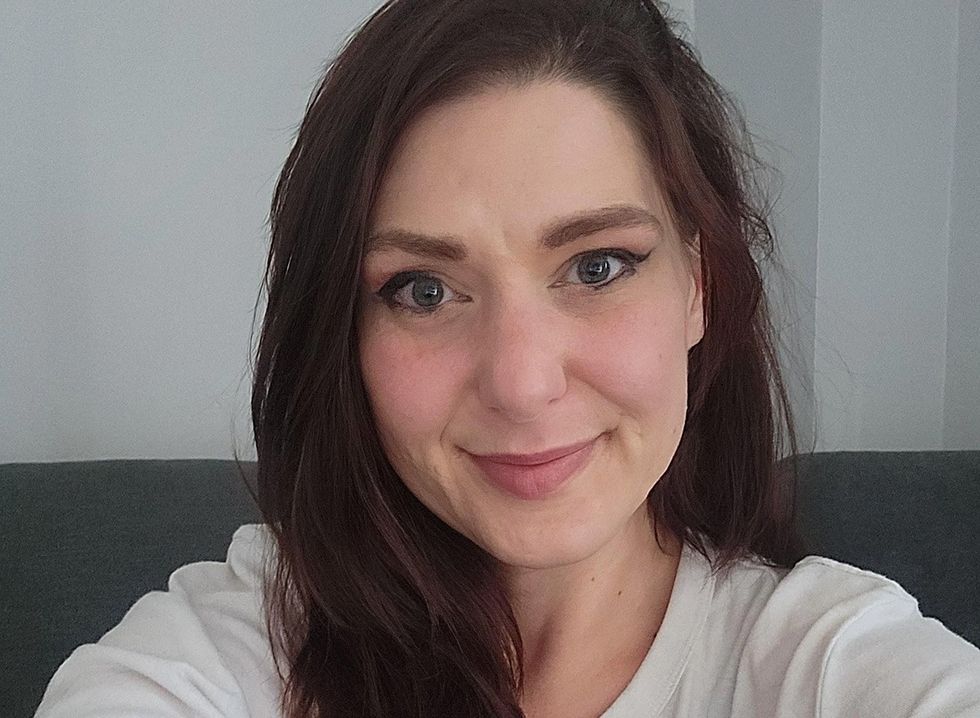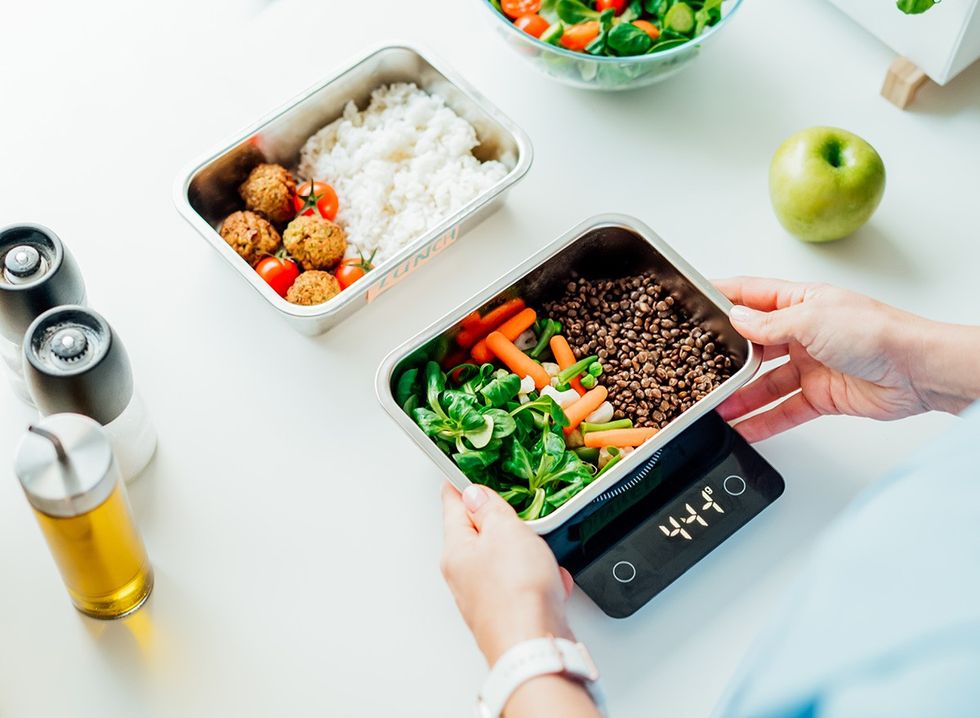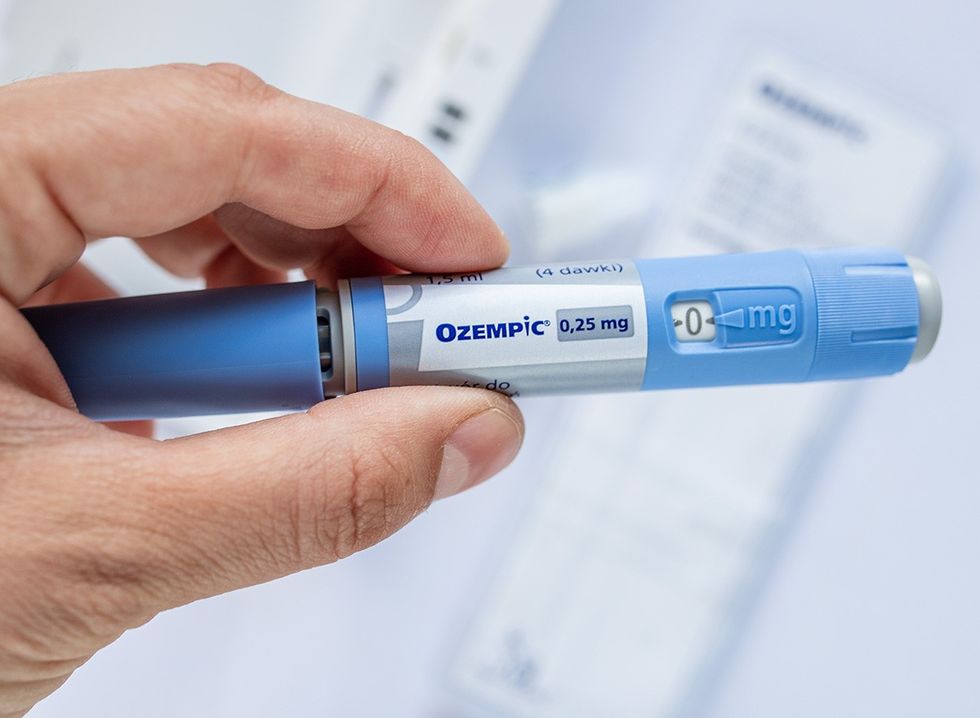Do you want to lose more than 40 pounds? While it might seem intimidating to embark on a major weight loss journey, there are lots of weight loss warriors who have shared their success stories to keep you inspired and motivated. Many of them have revealed the easy and doable lifestyle changes they made that enabled them to slim down and keep the weight off. Here are 20 tips from nine men and women who have lost up to 165 pounds to help you achieve your weight loss goals.
Indya Ago Lost 120 Pounds by Learning How to Have a “Balanced” Approach to Food
@indyaagosSomething I tell my clients when they first start coaching with me is that in order for these results to be sustainable we have to create balance. when I first started my weight loss journey, I used to restrict myself so much, I would demonize so many different kinds of foods that diet culture had brainwashed me, and into believing were the reason why I wasn’t able to reach the results I was looking for. Which just led me to cycles of binging, and creating a very unhealthy relationship between nutrition and my body. Through proper education on macronutrients, I was able to heal this relationship. And this is how I help my clients and maintain their goals as well. Education is power. WIEIAD DEETS: 💚 breakfast: protein, pancakes, egg, white scramble, turkey bacon 💚 snack: fruit, salad, and protein smoothie 💚 lunch: birria tacos + veg 💚 dinner: seafood boil Babe, if you’re ready to finally create a lifestyle transformation that’s sustainable while still eating all of the foods that you enjoy, I would love to work with you. I’m now accepting new clients, the link is in my bio. Let’s get to work! #weightlosstransformation #weightlosstips #weightlossjourney #weightlossgoals #weightlosscoach #weightlosshelp #weightlosschallenge #fatlosstips #fatlossjourney #nutritiontips #mindsetcoach #caloriedeficit #summerbody #nutritioncoach #fitnesscoach #mindset #mindsetcoach #mentalhealth #weightlosstransformation #fatlosstips #fatlosstransformation #whatieatinaday #highprotein
Indya Agos (@indyaagos) is a weight loss warrior and coach who lost a whopping 120 pounds via natural methods. “Something I tell my clients when they first start coaching with me is that in order for these results to be sustainable we have to create balance,” she says. “When I first started my weight loss journey, I used to restrict myself so much,” she continues. “I would demonize so many different kinds of foods that diet culture had brainwashed me, and into believing were the reason why I wasn’t able to reach the results I was looking for.”
She Also Educated Herself on Macronutrients
Indya previously suffered from “cycles of binging, and creating a very unhealthy relationship between nutrition and my body,” she maintains. “Through proper education on macronutrients, I was able to heal this relationship. And this is how I help my clients and maintain their goals as well. Education is power.”
RELATED: 15 Reasons Why You May Not Losing Weight While on Ozempic
She “Started Slow” and Learned “Self-Trust”
@indyaagosIf you wanna lose 80 pounds next year, I’m gonna tell you exactly how to do it! No gatekeeping the secret to success here. The number one thing that you need to get clear on, is the amount of time it’s going to take you to achieve your goal, the amount of effort required for you to get there, and, of course, why it’s so important to you. Setting a realistic expectation for yourself, while also simultaneously connecting with your why is the first step to create the foundation. You need to be successful through 2024. When you understand that this journey is going to take time, it’s going to require sacrifice, it’s going to require you stepping so far out of your comfort zone, that you may be paralyzed by fear at times. But being okay with the discomfort. Surrendering to knowing that in those moments of uncertainty, in those moments of insecurity, and discomfort, are facilitating growth. Connecting with knowing that, allowing yourself to grow, is what is going to help you reach your goals. And not only reach your goals, sustain those achievements. Baby, 2024 can be your year, and the first thing that you need to do, is get your mindset right. Know why you’re on this journey, know what you need to do to get from point A to point B, and set yourself up for success. Start building the mindset, habits, and routines into your daily life now in order to be successful 2024. and if you’re ready to take the next step, you’re ready to invest in yourself. I’m now accepting applications for January. The link is in my bio let’s get to work!🤘🏽 #weightlosstransformation #weightlosstips #weightlossjourney #weightlossgoals #weightlosscoach #weightlosshelp #weightlosschallenge #fatlosstips #fatlossjourney #nutritiontips #mindsetcoach #newyearsresolution #newyearnewme #nutritioncoach #fitnesscoach
In another video, Indya reveals another tactic that helped her lose so much weight. “You got to start slow,” she says. “If you approach this from an all or nothing mentality, you are only setting yourself up for failure. A big part of this journey is regaining self-trust. You are so used to letting yourself down. The way that you build trust with yourself again is by following through with the promises that you've made to yourself.”
And Took a Deep Dive Into Her Failed Attempts at Weight Loss
Another thing she did is “going to require you to dig deep,” she says. “We need to figure out what your main excuses or your repeated point of failure chances are. You've been stuck in the same exact cycle, repeating the same narratives as to why you haven't been able to be successful in the past. If your story is that you never have any time, then we need to figure out why you're not prioritizing making time. People make time for what's important to them. If the story is that you are overwhelmed and you have no idea where to start, then it is time to reach out for help so that you have a plan of action as well as guidance.”
Raven Norwood Lost 165 Pounds By Cutting Processed Foods From Her Diet
 rowwithraven/Instagram
rowwithraven/Instagram
Raven Norwood, 28, of Huntington Beach, California, started her weight loss journey at 212 pounds and has managed to drop down to 155 pounds, losing 165 pounds in two years. In an interview with Body Network, she explains that she used to eat food containing several dyes, fast food, and packaged food with GMOs, too much MSG, and preservatives. While she didn’t eliminate “any specific food groups because balance is the key to longevity,” she did cut the above from her diet and started cooking her own meals “as much as possible.” Creating healthy relationships with all food groups is so important when it comes to keeping the weight off, she stresses. “Balance is key, so, if I want a cookie here and there, I eat the cookie… no biggie!”
RELATED: 20 Incredible Ozempic Success Stories of All Time
She Also Amped Up Her Water Intake
 raven.grl/Instagram
raven.grl/Instagram
Raven adds that “lots of water” keeps her hydrated and feeling full. According to the Mayo Clinic, hydration is important for a variety of reasons. Water helps get rid of waste through urination, perspiration, and bowel movements, keeps your temperature normal, lubricates and cushions joints, and helps protect sensitive tissues.
She Fell in Love with a Boutique Fitness Method
 raven.grl/Instagram
raven.grl/Instagram
Raven also encourages finding a fitness form that you love. She discovered rowing at her local Row House. “I love how boutique and specialized gyms are getting more recognition! When I first found Row House, I had never seen a gym dedicated to rowing,” she says. “And on top of that you get floorwork exercises, group fitness and the wonderful community that comes along with it! I think a lot of people would benefit from boutique gyms.”
She Took Progress Pictures
 raven.grl/Instagram
raven.grl/Instagram
Progress photos were also an important part of Raven’s weight loss journey. “Sometimes your mind will play tricks on you, and make you feel like you haven’t done as much as you have,” she says. If she feels discouraged, she will look at her “Day 1” photo and it will provide instant motivation. “Take photos because your mind will play tricks on you, but those photos won’t,” she says.
RELATED: 15 Quick Ways to Lose Body Fat Percentage in a Week
Dils Less Lost 50 Pounds by Not Drinking Coffee on an Empty Stomach
Dils Lee (@dilshealth) lost 50 pounds by making a few simple lifestyle habit changes, which not only aided in weight loss, but were a game-changer in her overall health, especially with her inflammation and hormonal imbalance. One of the first changes that she made? “I stopped drinking coffee on an empty stomach and started making my breakfast look like this,” she said. “Drinking coffee on an empty stomach can lead to bloating, nausea, and anxiety, and it can also raise your cortisol levels, which can negatively impact ovulation weight and hormonal imbalances.”
She Also Switched From HIIT to Low Intensity Workouts
You don’t have to do HIIT workouts to lose weight. The second change that she made “was stopping all high intensity training while I was losing weight,” she said. “I found that I harbored a lot of inflammation in my face, arms, body, stomach, and legs everywhere.” Instead, she opted for lower intensity training. “Basically, by switching to lower intensity workouts, I've found that my waist has drastically come in. My stomach is much more flat, and I'm actually building a lot of tone and muscle in my arms and legs,” she says.
And, She Prioritized Sleep
“The fourth change that I made is that I introduced a healthy sleep routine,” Dils reveals. “My routine includes using supplements like magnesium and then not using my phone an hour before bed. Prioritizing sleep will help your body recover after physical activity. It'll also help with hormone regulation, metabolic regulation, stress and emotional wellbeing.” What are the health benefits of sleep? According to the Sleep Foundation, getting enough z’s is a mood booster, promotes heart health, regulates blood sugar, improves mental function, restores your immune system, helps relieve stress, and aids in weight loss.
Joseph Graham Jr. Lost 75 Pounds By Jump Roping and Doing Pushups
@theguywiththepinkshoes🎟️ before and after - 50 lbs (weight loss transformation)🔥 show people where you started🌸✌🏾 #WeightLossJourney #WeightLoss #Fittok #jumprope #jumpropechallenge #transformationchallenge #HealthyLiving #FitnessGoals #BeforeAndAfter #BodyPositivity #WellnessWednesday #GlowUp #FitnessMotivation #LifestyleChange #DietTransformation #MindBodySoul #SelfLoveJourney #EmpowerYourself #FitnessInspiration #ChangeIsGood #WeightLossStory #ProgressNotPerfection #InspireOthers #WellnessTransformation #MotivatedMindset #FitnessJourney #PositiveChanges #NewYou #HealthyHabits #fyp #foryourpage #beforeandafterweightloss #ilikewhenitrains
No gym, no problem. Joseph Graham Jr. (@theguywiththepinkshoes) is a fitness influencer and “crossrope athlete” who lost a whopping 75 pounds and toned up his dad bod by jumping rope and doing push ups at home. He does “harder” push ups, he says. “It's not enough to just do as many as you can and do them fast. Once you feel comfortable doing pushups, once you feel like you've kind of got it down, you have to start making it harder for yourself,” he explains. “The resistance is what builds the strength, right?
Alexandra Lost 40 Pounds by Eating the Same Meals Every Day
Online fitness coach Alexandra (@alexx.fitt) personally lost 40 pounds by eating the same meals daily. “For 1-2 months I ate the same meals every single day why? Because I was confused I didn’t know what to eat or where to start so I ate the same thing everyday,” Alexandra confesses in the caption of her video.
She Also Walks 10,000 Steps a Day
In another video she reveals that walking 10,000 steps a day was also key. “I weigh around 150lbs so walking 10k steps burns an extra 300-400 calories a day without spending hours on the stair master,” says Alexandra. “Walking can be done anywhere you don’t have to get fancy gym clothes you can literally walk in your pjs,” she adds. And, it helps regulate hunger. “Walking is not an extremely difficult exercise and it can help regulate your appetite hormones and reduce feelings of hunger,” she says.
RELATED: 12-3-30 Walking Method: 20 Proven Tips to Lose Weight Faster
David Tuckfield Lost 60 Pounds EMS Workouts
 David Tuckfield
David Tuckfield
David Tuckfield, 61, dropped 60 pounds and reduced his body fat by 23 percent in 16 months by incorporating electro muscle stimulation (EMS) workouts into his routine, which he discovered at BODY20. “I was very skeptical when I first tried the EMS workouts. I was shocked after my demo workout how much I felt a difference,” he told Body Network. “For me, the amazing thing about the EMS workouts to me is that I can actually feel or sense my muscles. That was something that I had never experienced. At first I could feel them only during the workouts, but now when I exert myself I can discern which muscles are engaged. I don’t have huge or impressive muscles, but that I am more in-tune with the muscles I have. It is a good feeling to feel your muscles engage when you do an activity.” Another “great thing” about the workout “is that you really get a full workout (or better) in 20 minutes,” he says.
He Also Set Long-Term Goals
 David Tuckfield
David Tuckfield
He also started looking at weight loss as a long-term goal. “Don’t think short term. Think of it as a very long journey,” he suggests. “You will plateau, and you should just be comfortable with that. If you don’t stress out about the plateaus, you will eventually work through them.” Daily weigh-ins also helped him. “If you’ve gained weight, ask yourself what you did yesterday that would have made you gain weight. Usually the answer is obvious,” he says.
Joy Maria Lost 70 Pounds with Hot Girl Walks
@therealjoyymariaReplying to @177777734 this is exactly how I did & you can too 🫶🏽🥂 #postpartumweightloss #weightlosstransformation #fatlossjourney #weightlossgoals #greenscreen
Joy Maria (@therealjoyymaria/video) is a weight loss influencer and mother who lost 70 pounds in less than 11 months with the help of, wait for it, “Hot girl walks,” she reveals in a video. “Walking is a thousand percent, the most underrated way to lose weight,” she adds, “and one of my favorite things to do is walk.” She started walking to her errands, walking to and from workouts, and whenever else she could get steps in.
She Also Followed a Meal Plan
@therealjoyymariaDont sleep on walking 🫶🏽 #hotgirlwalk #walking #weightloss #weightlosstransformation #weightlosscheck #postpartumweightloss
“If somebody is telling you that you can lose weight without being in a calorie deficit run because they're lying,” she adds, calling it “the most important step” to losing weight. “I know you guys have heard the saying, you cannot outrun a bad diet, and it's so true. Google, TDEE calculator. From there, put in your information. I'm gonna tell you exactly how many calories you need to eat. I ate about 1600 to 1800 calories daily, just depending on my activity level for the day. If I did two workouts that day, I would eat closer to 1800. If I had a more sedentary day, I would eat closer to 1500 to 1600.” She also followed a meal plan. “I have a seven day meal plan available at the top of my profile. It just makes it really easy when you're going to a grocery shop, when you're first starting out, when things are structured, it's gonna make it a lot easier to follow and just to stay consistent, not skipping breakfast, especially if we're exercising.”
Gen Cohen Lost 50 Pounds by Doing the 12-3-30
Gen Cohen, CNC, lost 50 pounds by doing a few different workouts, including the 12-3-30.
She said that “rather than subscribing to some crazy fitness routine, I'd commit to lifting weights three maximum four times per week and prioritize getting a 60 minute walk in per day,” in a video. “You can go to the gym and do 12-3-30. You can take your dog for a walk. You can get a walking pad and put it under your desk. I don't care how, just 60 minutes of walking.”
Joan Henning Lost 130 Pounds with Keto
 Joan Henning
Joan Henning
In 2019, Joan Henning started her 130-pound weight loss journey with the keto diet.“ I was able to start keto,” she says. She stayed on the low carb diet for “months.” While on keto, “I probably lost about 10 pounds because keto, it comes off quickly,” she said.
💪🔥Body Booster: Start your weight loss journey slowly and avoid an all-or-nothing mentality to prevent setting yourself up for failure. Focus on regaining self-trust by consistently following through with the promises you make to yourself.













 meltwithmich/TikTok
meltwithmich/TikTok karkeliamauney/TikTok
karkeliamauney/TikTok iamkesiaberrios/TikTok
iamkesiaberrios/TikTok lindamarieinmpls/TikTok
lindamarieinmpls/TikTok amyinhalf/TikTok
amyinhalf/TikTok Shutterstock
Shutterstock zenjen.meditation/Instagram
zenjen.meditation/Instagram britts_getting_fit_/Instagram
britts_getting_fit_/Instagram Shutterstock
Shutterstock
 NefariousnessNo695/Reddit
NefariousnessNo695/Reddit mrstruong/Reddit
mrstruong/Reddit Shutterstock
Shutterstock gojacquelean/Instagram
gojacquelean/Instagram Shutterstock
Shutterstock aperrygoodlife/Instagram
aperrygoodlife/Instagram taylor.kast04/Instagram
taylor.kast04/Instagram anafontini/TikTok
anafontini/TikTok Shutterstock
Shutterstock Shutterstock
Shutterstock






 What Research ShowsShutterstock
What Research ShowsShutterstock Consult with obesity medicine specialistsShutterstock
Consult with obesity medicine specialistsShutterstock Organic Salad Greens: The Foundation for Lasting FullnessShutterstock
Organic Salad Greens: The Foundation for Lasting FullnessShutterstock

 Lie Number FiveCopyright balancebyhilary/Instagram
Lie Number FiveCopyright balancebyhilary/Instagram Lie Number FourCopyright balancebyhilary/Instagram
Lie Number FourCopyright balancebyhilary/Instagram Overcoming These 5 Lies Helped Her Lose 100 PoundsCopyright balancebyhilary/Instagram
Overcoming These 5 Lies Helped Her Lose 100 PoundsCopyright balancebyhilary/Instagram Lie Number OneCopyright balancebyhilary/Instagram
Lie Number OneCopyright balancebyhilary/Instagram Lie Number TwoCopyright balancebyhilary/Instagram
Lie Number TwoCopyright balancebyhilary/Instagram Lie Number ThreeCopyright balancebyhilary/Instagram
Lie Number ThreeCopyright balancebyhilary/Instagram You Can Become the Person You Want to BeCopyright balancebyhilary/Instagram
You Can Become the Person You Want to BeCopyright balancebyhilary/Instagram

 raven.grl/Instagram
raven.grl/Instagram raven.grl/Instagram
raven.grl/Instagram raven.grl/Instagram
raven.grl/Instagram David Tuckfield
David Tuckfield David Tuckfield
David Tuckfield Joan Henning
Joan Henning
 Samantha Costa/YouTube
Samantha Costa/YouTube Shutterstock
Shutterstock Samantha Costa/YouTube
Samantha Costa/YouTube Shutterstock/siam.pukkato
Shutterstock/siam.pukkato Shutterstock
Shutterstock Shutterstock
Shutterstock Shutterstock
Shutterstock sam.costaa/Instagram
sam.costaa/Instagram

 I'm a Nutritionist and These 9 High-Protein Snacks Keep My Clients Full While Losing 50 Pounds
I'm a Nutritionist and These 9 High-Protein Snacks Keep My Clients Full While Losing 50 Pounds
 Shutterstock
Shutterstock 2. Processed FoodsShutterstock
2. Processed FoodsShutterstock Shutterstock
Shutterstock Shutterstock/Prostock-studio
Shutterstock/Prostock-studio Shutterstock
Shutterstock Pro TipsShutterstock
Pro TipsShutterstock Shutterstock
Shutterstock Shutterstock
Shutterstock Shutterstock
Shutterstock Shutterstock
Shutterstock Don’t Drink as Much AlcoholShutterstock
Don’t Drink as Much AlcoholShutterstock Most Women on GLP-1s Are Making a Few Common MistakesShutterstock
Most Women on GLP-1s Are Making a Few Common MistakesShutterstock Soda and Sugary DrinksShutterstock
Soda and Sugary DrinksShutterstock Shutterstock
Shutterstock Eat BreakfastShutterstock
Eat BreakfastShutterstock And Improve Insulin SensitivityShutterstock
And Improve Insulin SensitivityShutterstock Belly Flab Strip Tip: Sugar and Fat Calories Leave Its Mark on Your BodyShutterstock
Belly Flab Strip Tip: Sugar and Fat Calories Leave Its Mark on Your BodyShutterstock Shutterstock
Shutterstock The Drugs Mimic the GLP-1 Hormone Naturally Produced by the BodyShutterstock
The Drugs Mimic the GLP-1 Hormone Naturally Produced by the BodyShutterstock 3. Deep-Fried ItemsShutterstock
3. Deep-Fried ItemsShutterstock